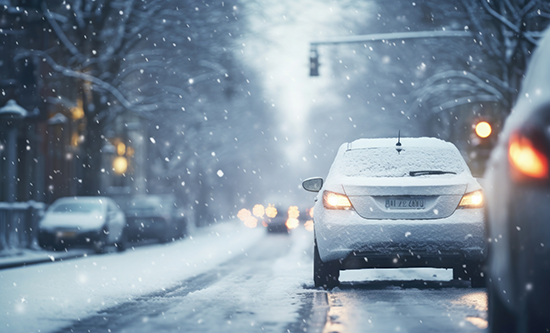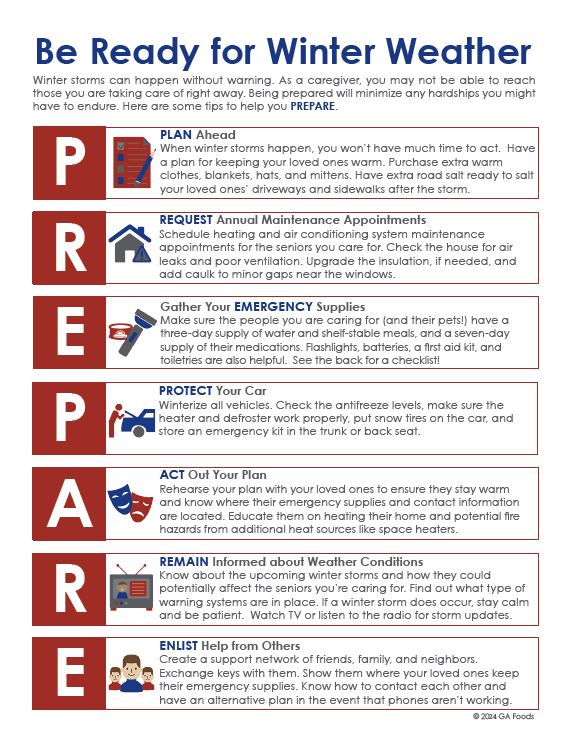10 Easy Tips to Safe This Winter!

Winter weather is here! Extreme weather conditions like snow, ice, and heavy rain make winter challenging, especially for seniors and their caregivers. Winter storms make traveling difficult, and many businesses close temporarily. To make winter storms less stressful, we’ve created a list of 10 ways caregivers can prepare aging adults for winter weather.
1. Keep additional supplies of shelf-stable meals handy. Ensure the pantry is well stocked with canned items and other foods with long shelf lives that do not require refrigeration. Consider signing the seniors you care for a home-delivered meals program. Meal providers, such as GA Foods, deliver shelf-stable meals to the home…even during bad weather!
2. Purchase extra winter clothing and blankets, if needed. Severe winter storms can cause power outages, meaning those you care for must bundle up indoors. Ensure they are equipped with jackets, hats, gloves, and warm socks. It is also a good idea to have blankets in the rooms where those you care for like to spend most of their time.
3. Stock up on medications and medical devices. Please ensure the aging adults you care for have at least a seven-day supply of their medications. When preparing for winter storms, keeping a list of their medications, dose, frequency, and contact information for their prescribing doctors and pharmacists is a great resource. It is also a good idea to keep backups of wheelchair batteries, oxygen, and other medical devices.
4. Place emergency supplies in an easy-to-access place. Planning for a power outage during winter storms is essential. Discuss with the older adults you care for to decide the best place to store emergency supplies, including batteries, a radio, and flashlights. Store the emergency supplies in an easy-to-access and central location in the house. Also, stock up on extra toiletries like toilet paper, toothpaste, and hand soap.
5 Schedule an appointment to have the heating system inspected. Many people neglect regular maintenance checks on their heating and air-conditioning systems. If the older adults you care for own their homes, schedule an annual maintenance appointment to inspect the heating system. Ask the maintenance person to check for insulation leaks and poor ventilation and inspect the heating system. These small issues can lead to more significant problems if left unchecked.
6. Winterize all vehicles. It is best to avoid driving during storms. However, if the aging adult in your care must travel, ensure their car is winterized. Take their car to the mechanic to have it inspected. Check the antifreeze levels, make sure the heater and defroster are working properly, put winter tires on the car, and store an emergency kit containing a windshield scraper, hats, mittens, a blanket, jumper cables, food, water, and a shovel, in the back seat.
7. Educate your members on heating their homes and potential fire hazards. Please ensure the people you care for feel comfortable operating their heating system. If they struggle to remember the steps, write instructions on paper and tape them on the wall near the thermostat. If they tend to be extra chilly during the winter months, teach them how to use their space heaters and fireplaces, if they have them. Find a good place to put the space heater so that it is not near any curtains or other objects that could be a potential fire hazard.
8. Create an emergency contact list. Winter storms and severe weather conditions can lead to road closures, fallen trees, and power lines, making checking in on those in your care difficult. Introduce yourself to their neighbors. Make a contact information sheet with friends and family who live close by, as well as neighbors. You may also consider giving a few trusted friends or neighbors a key to their homes to check in on them if you cannot.
9. Plan for the animals. If the seniors you’re caring for have animals ensure they have enough food and medications for their pets. Research volunteer organizations close by; some cities have volunteer organizations that help seniors care for their animals.
10. Store road salt in the garage. Black ice lingers long after winter storms pass. Regularly check to ensure the driveway and sidewalks around the senior’s home have been salted, especially if they walk outside to get their mail, so they don’t slip and fall. Winter storms can happen without warning. Be prepared and eliminate unnecessary stress by downloading our tip sheet, contact and medication information chart, and winter weather supplies checklist. Wishing you a safe winter!
Click here to download our winter preparation tip sheet and emergency information checklist.

Alexandria is the Senior Product Manager at GA Foods. She is a Registered Dietitian and has worked in clinical rehabilitation facilities and the post-discharge food industry. Her experience gives Alexandria unique insights into social disparities and how health is affected. She and her growing family live in Tennessee, enjoying the mountain air, gardening, and tending their chickens.



